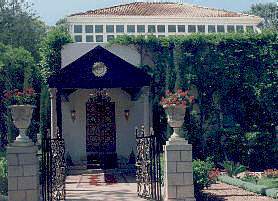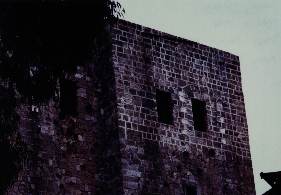![]() Founder of the Bahá’í Faith
Founder of the Bahá’í Faith
Born in 1817, Bahá’u’lláh was a member of one of the great patrician families of Persia. The family could trace its lineage to the ruling dynasties of Persia’s imperial past, and was endowed with wealth and vast estates. Turning His back on the position at court which these advantages offered Him, Bahá’u’lláh became known for His generosity and kindliness which made Him deeply loved among His countrymen. This privileged position did not long survive Bahá’u’lláh’s announcement of support for the message of the Báb . Engulfed in the waves of violence unleashed upon the Bábís after the Báb’s execution Bahá’u’lláh suffered not only the loss of all His worldly endowments but was subjected to imprisonment, torture, and a series of banishments. The first was to Baghdad where, in 1863, He announced Himself as the One promised by the Báb. From Baghdad, Bahá’u’lláh was sent to Constantinople, to Adrianople, and finally to Acre, in the Holy Land, where He arrived as a prisoner in 1868.
From Adrianople and later from Acre, Bahá’u’lláh addressed a series of letters to the rulers of His day that are among the most remarkable documents in religious history. They proclaimed the coming unification of humanity and the emergence of a world civilization. The kings, emperors, and presidents of the nineteenth century were called upon to reconcile their differences, curtail their armaments, and devote their energies to the establishment of universal peace. Bahá’u’lláh passed away at Bahjí, just north of Acre, and is buried there. His teachings had already begun to spread beyond the confines of the Middle East, and His Shrine is today the focal point of the world community which these teachings have brought into being. In the middle of the last century, one of the most notorious dungeons in the Near East was Tehran’s Black Pit. Once the underground reservoir for a public bath, its only outlet was a single passage down three steep flights of stone steps. Prisoners huddled in their own bodily wastes, languishing in the pit’s inky gloom, subterranean cold and stench-ridden atmosphere. In this grim setting, the rarest and most cherished of religious events was once again played out: mortal man, outwardly human in other respects, was summoned by God to bring to humanity a new religious revelation. The year was 1852, and the man was a Persian nobleman, known today as Bahá’u’lláh. During His imprisonment, as He sat with his feet in stocks and a 100-pound iron chain around his neck, Bahá’u’lláh received a vision of God’s will for humanity. The event is comparable to those great moments of the ancient past when God revealed Himself to His earlier Messengers: when Moses stood before the Burning Bush; when the Buddha received enlightenment under the Bodhi tree; when the Holy Spirit, in the form of a dove, descended upon Jesus; or when the archangel Gabriel appeared to Muhammad. Bahá’u’lláh’s experience in the Black Pit set in motion a process of religious revelation which, over the next 40 years, led to the production of thousands of books, tablets and letters–which today form the core of the sacred scripture of Bahá’í Faith. In those writings, He outlined a framework for the reconstruction of human society at all levels: spiritual, moral, economic, political, and philosophical. In the past, God’s Messengers have for the most part presented their messages to humanity by speaking or preaching; these outpourings have been recorded by others, sometimes during the Prophet’s life, sometimes later, from the memory of His followers. The Founder of the Bahá’í Faith, however, Himself took up pen and paper and wrote down for humanity the revelation He received or dictated His message to believers who served as secretaries. Bahá’u’lláh addressed not only those timeless theological and philosophical questions that have plagued humanity since antiquity–such as Who is God? What is goodness? and Why are we here?–but also the questions that have preoccupied 20th century thinkers: What motivates human nature? Is real peace indeed possible? Does God still care for humanity? From His words, the worldwide community of Bahá’u’lláh draws its inspiration, discovers its moral bearing and derives creative energy. Bahá’u’lláh, whose name means The Glory of God in Arabic, was born on 12 November 1817 in Tehran. The son of a wealthy government minister, Mirza Buzurg-i-Nuri, His given name was Husayn-`Alí and His family could trace its ancestry back to the great dynasties of Iran’s imperial past. Bahá’u’lláh led a princely life as a young man, receiving an education that focused largely on horsemanship, swordsmanship, calligraphy and classic poetry. In October 1835, Bahá’u’lláh married `Asiyih Khánum, the daughter of another nobleman. They had three children: a son, `Abdu’l-Bahá, born in 1844; a daughter, Bahíyyih, born in 1846; and a son, Mihdi, born in 1848. Bahá’u’lláh declined the ministerial career open to Him in government, and chose instead to devote His energies to a range of philanthropies which had, by the early 1840s, earned Him widespread renown as Father of the Poor. This privileged existence swiftly eroded after 1844, when Bahá’u’lláh became one of the leading advocates of the Bábí movement . Precursor to the Bahá’í Faith, the Bábí movement swept Iran like a whirlwind–and stirred intense persecution from the religious establishment. After the execution of its Founder, the Báb, Bahá’u’lláh was arrested and brought, in chains and on foot, to Tehran. Influential members of the court and the clergy demanded a death sentence. Bahá’u’lláh, however, was protected by His personal reputation and the social position of His family, as well as by protests from Western embassies. Therefore, He was cast into the notorious Black Pit, the Siyáh-Chál in Persian. Authorities hoped this would result in His death. Instead, the dungeon became the birthplace for a new religious revelation. Bahá’u’lláh spent four months in the Black Pit, during which time he contemplated the full extent of His mission. I was but a man like others, asleep upon My couch, when lo, the breezes of the All-Glorious were wafted over Me, and taught Me the knowledge of all that hath been, He later wrote. This thing is not from Me, but the One Who is Almighty and All-Knowing. And He bade Me lift up My voice between earth and heaven. Bahá’u’lláh — Exile In 1856, at the urging of the exiled Bábís, Bahá’u’lláh returned to Baghdad. Under His renewed leadership, the stature of the Bábí community grew and Bahá’u’lláh’s reputation as a spiritual leader spread throughout the city. Fearing that Bahá’u’lláh’s acclaim would re-ignite popular enthusiasm for the movement in Persia, the Shah’s government successfully pressed the Ottoman authorities to send him farther into exile. In April 1863, before leaving Baghdad, Bahá’u’lláh and His companions camped in a garden on the banks of the Tigris River. From 21 April to 2 May, Bahá’u’lláh shared with those Bábís in His company that He was the Promised One foretold by the Báb–foretold, indeed, in all the world’s scriptures. The garden became known as the Garden of Ridván, which indicates paradise in Arabic. The anniversary of the twelve days spent there are celebrated in the Bahá’í world as the most joyous of holidays, known as the Ridván Festival. On 3 May 1863, Bahá’u’lláh rode out of Baghdad, on His way to Constantinople, the imperial capital, accompanied by His family and selected companions. He had become an immensely popular and cherished figure. Eyewitnesses described the departure in moving terms, noting the tears of many scholars, government officials and onlookers and the honor paid to Him by the authorities. After four months in Constantinople, Bahá’u’lláh was sent as a virtual state prisoner to Adrianople (modern Edirne), arriving there on 2 December 1863. During the five years He spent there, Bahá’u’lláh’s reputation continued to grow, attracting the intense interest of scholars, government officials and diplomats. Beginning in September 1867, Bahá’u’lláh wrote a series of letters to the world leaders of His time, addressing, among others, Emperor Napoleon III, Queen Victoria, Kaiser Wilhelm I, Tsar Alexander II of Russia, Emperor Franz Joseph, Pope Pius IX, Sultan Abdul-Aziz, and the Persian ruler, Nasiri’d-Din Shah. In these letters, Bahá’u’lláh openly proclaimed His station. He spoke of the dawn of a new age. But first, He warned, there would be catastrophic upheavals in the world’s political and social order. To smooth humanity’s transition, He urged the world’s leaders to pursue justice. He called for general efforts at disarmament and urged the world’s rulers to band together into some form of commonwealth of nations. Only by acting collectively against war, He said, could a lasting peace be established. Continued agitation from opponents caused the Turkish Government to send the exiles to Acre, a penal city in Ottoman Palestine. Acre was the end of the world, the final destination for the worst of murderers, highway robbers and political dissidents. A walled city of filthy streets and damp, desolate houses, Acre had no source of fresh water, and the air was popularly described as being so foul that overflying birds would fall dead out of the sky. Into this environment, Bahá’u’lláh and His family arrived on 31 August 1868, the final stage in His long exile. He was to spend the rest of His life, 24 more years, in Acre and its environs. At first confined to a prison in the barracks, Bahá’u’lláh and His companions were later moved to a cramped house within the city’s walls. The exiles, widely depicted as dangerous heretics, faced animosity from the city’s other residents. Even the children, when they ventured outside, were pursued and pelted with stones. As time passed, however, the spirit of Bahá’u’lláh’s teachings penetrated the bigotry and indifference. Even several of the town’s governors and clergy, after examining the teachings of the Faith, became devoted admirers. As in Baghdad and Adrianople, Bahá’u’lláh’s moral stature gradually won the respect, admiration and even leadership of the ommunity at large. It was in Acre that Bahá’u’lláh’s most important work was written. Known more commonly among Bahá’ís by its Persian name, the Kitáb-i-Aqdas (the Most Holy Book), it outlines the essential laws and principles that are to be observed by His followers, and lays the groundwork for Bahá’í administration. In the late 1870s, Bahá’u’lláh was given the freedom to move outside the city’s walls, and His followers were able to meet with Him in relative peace and freedom. He took up residence in an abandoned mansion and was able to further devote Himself to writing. On 29 May 1892, Bahá’u’lláh passed away. His remains were laid to rest in a garden room adjoining the restored mansion, which is known as Bahjí. For Bahá’ís, this spot is the most holy place on earth. |

